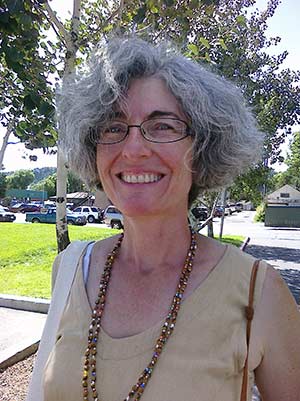
Reporter’s Notebook: Tour of chapters kindles respect for “middle managers” of the rez
CHINLE

Cindy Yurth
It took me a little over two years, but I finally completed my tour of every chapter on the reservation this fall.
The circuit put thousands of miles on my vehicle and took me to some jaw-dropping scenery, mysterious ruins, secret springs, heart-stopping roads and lunar wastelands.
I met some of the most interesting people on the reservation. My tour guides ranged from eight-year-olds to nonagenarians.
I heard fantastic stories I’ve never seen written anywhere, most of which I could print, but some of which I will reluctantly take to my grave at the request of the tellers. Some of them could be backed up by facts, but others have a truth that transcends the factual. These were not your typical news stories; I let local people tell their truth as they saw it, and the reader can glean from it what he will.
It was a magical journey I will never forget, and I made some friendships that endure. There is no way to thank the rural people of the Navajo Nation who invited me into their humble homes and shared their stories and photos, smiles and tears, a cup of coffee, food they had grown themselves or had to drive miles to procure, and old-timey cordiality. My guide in White Cone even managed to find my cell phone after I dropped it on a dirt road in the middle of nowhere.
If I take anything away from this experience, however, it is a profound respect for the chapter officials.
Anyone who has ever tried to work her way up in the corporate world knows that Dante should have had a ring in his Inferno for middle management. It is a special kind of hell in which you are invested with a huge wedge of responsibility and a tiny sliver of resources.
You are the first line of defense between the company and the public, and the last to be awarded recognition or a raise.
But the chapter level of Navajo Nation government is a hell unto itself. I can’t imagine why anyone would run for chapter official, and yet people do, time and time again. Anyone who does it more than once deserves a medal.
Sure, there are some corrupt chapter officials. And some who seem to be corrupt but are really just disorganized and way too trusting of the people they hire.
But the vast majority of chapter officials I have met over the past two years are in the job because they are sincerely concerned about their people.
Unfortunately, the way the Navajo Nation government is structured, they can’t do much for them. Unlike city and county governments off the reservation, they have no way to impose taxes to pay for the scholarships, water lines, home improvements, even the new chapter buildings the people demand at every meeting (other than in Kayenta Township, and why that successful experiment hasn’t been replicated all over the Rez is beyond me).
Instead, they must wait like serfs upon the noblesse oblige of the Navajo Nation Council. Whether they are thrown a few crumbs or are the recipient of a substantial investment appears to depend, all too often, on whether their Council delegate is from their chapter. Sometimes their request floats to the top of the list just in time for the next Council election, and the next Council shifts that money somewhere else.
Chapter certification, which would allow chapters to adopt a local tax ordinance, looked like it was going to be the answer, but after To Nanees Dizi’s new government got caught with its hand in the cookie jar, the Council shortened the leash again (as though none of its own members had ever gotten caught with their hands in the cookie jar).
Some of the more progressive chapters have figured out ways to circumvent
Window Rock by forming non-profits that can raise grant money for projects, but that’s not the same as taxing local people and asking them what they want done with THEIR money as counties do in the outside world.
Twenty-fourteen was a frustrating year for a lot of Navajos, and the chapter officials were certainly among them. Next year — hopefully, at some point — a new administration will be sworn in, and we’ll get a lot of new Council delegates as well. Here’s hoping they figure out some way to get the money and the decision-making authority down to the rural communities that need it the most.







 Highway 264,
Highway 264, I-40, WB @ Winslow
I-40, WB @ Winslow